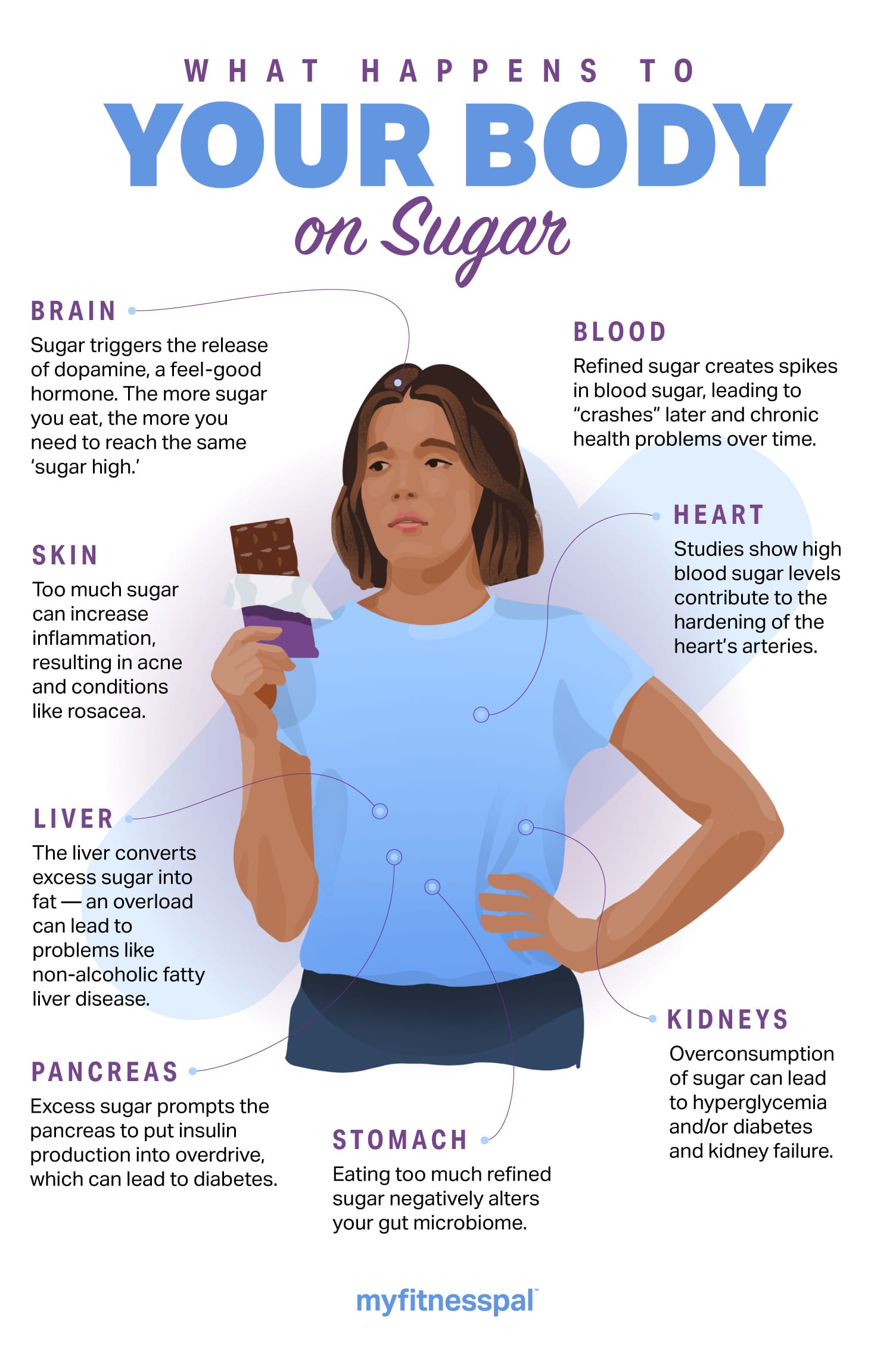Sugar is often maligned for a host of chronic health problems, most notably heart disease. Not only can consuming too much stand in the way of your goal to lose weight, but it can also crowd out good-for-you, nutrient-rich foods from your diet.
Despite the warnings, many people still overdo it. “The average daily sugar consumption in the U.S. is 73 grams, or 17.4 teaspoons, which has declined somewhat in recent years, but is still well above optimal levels,” says Margaret W. Eich, RD, author of “Breaking the Sugar Habit.” In this case, she follows the American Diabetes Association and American Heart Association’s guidelines, which are no more than 24 grams (6 teaspoons) and 36 grams (9 teaspoons) per day for women and men, respectively.
It’s helpful to learn exactly what sugar’s doing in the body — from the very first bite — to help you create healthier habits and meet your nutrition goals.

HOW YOUR BODY BREAKS DOWN SUGAR
Eat cookies, ice cream, candy or any number of delectable treats and your body breaks down the added sugar it contains into glucose and fructose. “Glucose is treated differently in the body than fructose,” says Eich. Glucose is a simple sugar or monosaccharide and the building block of carbohydrates, the body’s preferred source of energy. “Glucose is absorbed directly into the bloodstream to be used as energy,” explains Eich. Fructose (often called fruit sugar), on the other hand, is processed in the liver, where it has to be converted to glucose before it can be used as energy. This is not usually a problem if you’re eating fruit, for example, because the fiber and nutrients help slow absorption and keep blood sugar levels stable. However, fructose is often found in processed foods (think high-fructose corn syrup) and when eaten in excess, the liver converts it into fat. This can have negative effects on triglyceride (a type of fat in your blood) levels and is a marker of heart disease.
WHY YOUR BODY ASKS FOR MORE
Thanks to the blood sugar surge and subsequent crash, you might find you need another handful of candy from the office bowl to feel “good” again. The process “often translates to a dip in mood and energy levels, depending on the person and amount of sugar consumed,” says Eich. Sugar is often thought of as addictive, because the brain adapts to the dopamine (“feel-good” chemicals) released each time you consume sugar. This means you’ll require more sugar to achieve that same sugar high. “It can often carry over into subsequent days where you continue to crave sugar,” says Eich.
HEALTH PROBLEMS IN THE LONG-TERM
We tend to focus on how overconsuming processed foods containing excess sugar may contribute to weight gain or make it difficult to lose weight, but the harmful effects are even greater. Excess sugar puts the pancreas into overdrive (which can lead to diabetes) and hardens the heart’s arteries (raising the risk of heart disease). It also raises blood pressure and lowers “good” HDL cholesterol,” says Eich. Finally, research shows too much sugar can alter your brain’s chemistry and result in an increased risk of depression.
THE BOTTOM LINE
It’s important to remember that not all sugar is created equal. Sugar is a natural component of foods like fruits, veggies, dairy products and grains. When you eat these whole foods, you also get a plethora of nutrients like vitamins, minerals, protein, fat and hydrating water. You also get fiber, which helps slow digestion and tempers the release of sugar into the bloodstream, preventing those aforementioned crashes. Try using an app like MyFitnessPal to monitor your sugar intake, help you prioritize whole foods and cut back on added sugar found in processed ones.
Originally published October 2019, updated February 2023
Ready to take the next step? Unlock MyFitnessPal Premium to access custom goal settings, quick-log recipes, and guided plans from a registered dietitian. Premium users are 65% more likely to reach their weight loss goals!




